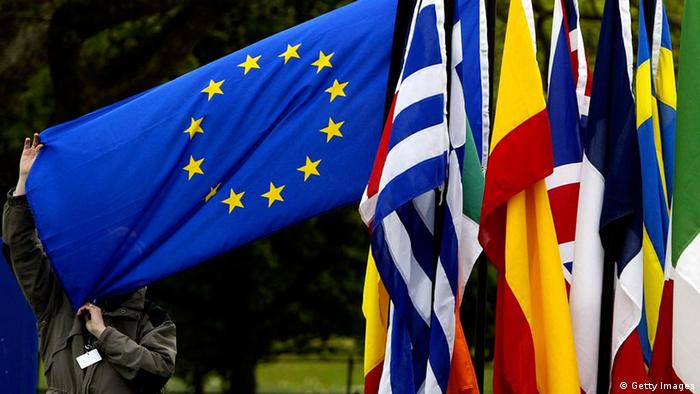More than half of Europeans believe that even during times of economic crisis, it is important to stick together. They are also convinced that people are suffering under the crisis through no fault of their own.
Despite the variety of challenges facing individual nations, two-thirds of Europeans are pro-solidarity, according to a survey by the Open Society Foundation. They also believe the economic crisis must be fought with cooperation. In Germany, 70 percent of people said they think regular people in countries like Greece are suffering the effects of the economic and financial crisis through no fault of their own.
The survey polled people in France, Germany, Italy, Spain and Great Britain when the Cyprus crisis was at its apex. Jordi Vaquer, director of the Open Society Initiative for Europe, said he was struck by how people in different countries had shared views.
"The general trends are not divergent although, for example, in Spain's case the appeal for solidarity is much stronger than in Germany," he said, adding that there was a greater call for solidarity in countries suffering more under the effects of the crisis than countries like Germany and Great Britain. "There's no dichotomy, the percentage is just lower."
German responses were in line with those of other Europeans. The study's main findings were that the current approach to solving the financial crisis is seen as counterproductive, that there is more solidarity in public opinion than in governments' actions, and that there is a strong sense of shared problems across Europe.
Some 67 percent of those polled said that combating economic and social problems should be a concern for all European Union members. Only the British took a different view on this issue, with 64 percent saying that each country should address its own problems.
Remote politicians
Nearly three-fourths of those surveyed said low incomes and rising prices would lead to poverty, and that they were afraid of an increase in unemployment across Europe. They also agreed in seeing younger people as having fewer employment opportunities, and that the situation for the elderly and sick has worsened. Also noted were increased fights and tension among European nations, with 85 percent of people saying that the economic crisis had caused serious and long-term damage to European unity and solidarity.
Politicians are to blame for the damage done, Vaquer said. "The problem is not that Europeans have lost a sense of solidarity, although this sentiment is under stress, rather we sense that the political management of the crisis is not in line with the strong bonds that Europeans still feel."
Some 92 percent of French, German, Spanish, Italians and Britons said politicians in Europe have lost touch with the concerns of the population over the course of the financial crisis. dw de



No comments:
Post a Comment